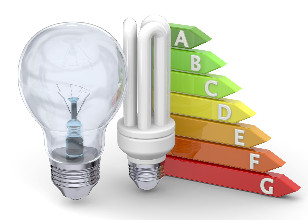The efficient use of energy, sometimes called the energy efficiency and energy saving, is the goal to reduce the amount of energy required for the supply of products and services.
The energy efficiency and saving of energy can be defined as the energy consumption level for the delivery of this service and usually relate to the improvement of this report.
The energy efficiency improvement implies the improvement of the energy characteristics of a delivery mechanism, different types of energy, but may also include the improvement of the management or organization of energy consumption.
Energy is inextricably linked with the socio-economic development, then it is not difficult to imagine that this trend can be a means to achieve political objectives outside the energy sector. Some of the results may be indirect, or be the result of a chain of actions that is difficult to ascribe to this concept.

However, it can be considered that the measures to improve the energy efficiency and energy saving have an impact on different sectors of the economy, often in different areas at the same time, and a direct impact in one economy can have an impact on another.
Traditionally, the focus in this field, is given to the use of less energy for the same energy services. However, this can also lead to an increase in the volume of services for the same amount of energy consumed.
In this way, the energy efficiency improvement can be achieved when both the lower consumption of energy to ensure the same level of services, the same amount of energy is consumed for the highest level of services. Activities for the energy efficiency and energy saving shall be oriented mainly on:
- the rational consumption of energy;
- energy-saving mode.
The energy efficiency and energy saving is an important aspect and are engaged on these activities, such as the reduction of losses in electricity production or an increase in the industrial activity. Are important in both forms.
Understand the domino effect that can occur as a result of increasing the energy efficiency and energy savings across the economy may be useful for the development of targeted policies.
Here are considered the various benefits from the efficient use of energy for the individual/sector/public/international types. Many of the benefits of energy efficiency and energy saving: the increase may provide considerable benefits in a broad spectrum of sectors.
A more extensive list many advantages that can be achieved with these measures:
Advantages for the energy efficiency and energy saving
The health and well-being
Particularly compelling is demonstrated a positive impact of energy efficiency and energy savings in the residential sector for the health of the population and the related social consequences. A wide range of diseases, in particular respiratory diseases and asthma among children, are closely related with the cold temperatures, moisture and mold in residential environments.
The improvement of energy efficiency and energy saving in the construction sector, in particular, can bring a wide range of tangible benefits for the health of the inhabitants of houses, offices and many other groups, and also the population in general. Health effects and equally associated with inefficient housing and appliances.
The fight against poverty and the availability of energy
In conditions of high energy prices and of the financial limits, poor people often cannot afford enough services to maintain healthy living conditions, are forced to is not sufficient to heat the home, to tolerate the poor air quality in closed environments, and/or give up other necessities, such as food: the phenomenon, sometimes known as “heat or food”. This situation is usually described as “fuel poverty”. Energy efficiency and energy conservation can solve the problem through the adoption of measures at the level of families to reduce the costs of electric energy through the insulation, and the design, supply of effective devices, equipment for space heating and water heating, and lighting, as well as learning the efficient use of energy among the tenants.
Access to the systems of production of energy provision is crucial for poverty alleviation through the provision of raw materials for socio-economic development. Energy efficiency measures undertaken by energy suppliers, which can free up additional resources by reducing the loss technique in their systems of production and distribution of energy.
Industrial productivity and competitiveness
There is a lot of improvements in industrial performance, which can guarantee the energy efficiency of plants and energy saving. These include an increase in profits, safer working conditions, consistency and improvement of the quality and release of product, reduction of capital and operational costs and the reduction in the consumption of waste and energy. The benefits can be obtained in the same sectors at the global level, increasing competitiveness, and can spread on the casual working conditions, safety and job satisfaction of individual employees.
The benefits to energy suppliers and infrastructure

At first sight it may seem that energy efficiency and energy saving which conflict with the commercial interests of the suppliers of energy. However, studies show that energy suppliers receive a lot of advantages from the point of view of providing better energy services to customers, reduce operating costs and increase your profits.
Up to 10% of all the benefits arising from measures to improve, probably, will be allocated directly to the energy providers, which explains why many public services are already making ambitious demand-side management measures, which stimulate in many countries its legal obligations in this field.
The increase in the value of assets
There is some evidence that investors are willing to pay the rent and the premium for the sale of real estate with the best energy performance.
For example, energy is one of the highest operating cost in most offices, therefore, the net present value of future energy savings can be added to the resale value. Studies show that the market is increasingly reflected these topics.
Existing analysis of the data show that the ”green” a building may have increased the resale value and rents, and also offer a wide range of benefits outside of the cost of the goods: they have higher rates of employment, greater comfort, lower management costs and lower rates of capitalization and the highest increase in performance.
Job creation
Investments in energy efficiency programs and energy savings have a significant potential to create jobs with short execution time. The net improvement in employment rates, it is possible to explain the programs of enhancement for the account of the creation of jobs and, indirectly, due to an excess of consumer spending in addition to other benefits for public budgets, as well as the reduction of unemployment benefits. Direct jobs created for the implementation of measures to improve the energy efficiency and energy saving is more easy to measure, and they, probably, will be very. Indirect jobs can also be created for the production of raw materials, however, these jobs can only be preserved for the period of a specific program.
The reduction of public expenditure, the energy-related is the perspective of the public sector as a single subject of the economy. The improvement of energy efficiency and energy savings will help reduce the load on the national budgets and improve the financial balance.
Energy security
The efficiency plays a role in reducing the dependency of countries on imports to meet their needs and, therefore, contributes to the formation of a different energy balance. The consequences that permeate the security, energy, structural, depend on the energy sector in a way or in another country.
Macroeconomic effects
The energy efficiency improvement and energy saving can lead to significant positive macroeconomic consequences, as the increase in the GDP, balance of trade, economic restructuring, employment and competitiveness. They can have a significant impact on the budget of the country. Investments in this direction, take on translation of capital with less energy powerful types of activities.
This can have significant consequences for the economics and management of energy in general, if the transfer involves the reconstruction of the economy most laborious activity.
The reduction of emissions of greenhouse gases
The improvement of energy efficiency and energy savings leading to a reduction in the consumption of energy from fossil fuels and to reduce emissions of greenhouse gases. In fact, the measures should be to encourage the 44% reduction in carbon emissions by 2035, and to have the possibility to reach the international objectives in the field of climate change.
Compared to other measures to reduce the emissions of greenhouse gases, energy efficiency, usually, it is more convenient and can be done quickly. The reduction in emissions already recognized as one of the main results of measures to improve the energy efficiency, and are often already measured as the self in the evaluation of existing programs.
Decline in energy prices

Decline in energy prices are determined by a number of factors, such as the energy level, the energy demand and the conditions of the trade market. All other conditions being equal, if the demand for services of decrease, energy prices should fall, and it is expected that the increase of energy efficiency and energy saving shall ensure the necessary reduction of the energy demand.
Management of natural resources
Another benefit from the reduction of the energy demand is in decreasing pressure on natural resources.
In view of the fact that by 2035 the global production of regular crude oil will reduce the energy efficiency and energy saving are increasingly important measure to relieve the pressure on limited resources. Development goals to sustainable development are the international task, and access to modern production facilities of energy provision is crucial to ensure the basic necessities of life, and also the conditions for socio-economic development.
























